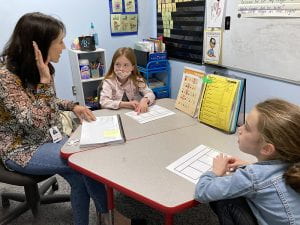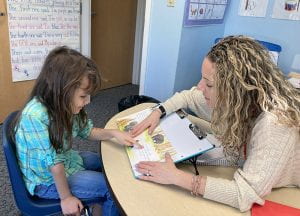“As a K-2 building, we knew coming into this school year that none of our students have had a typical school experience and that we had to look at how to do things differently,” explains William O. Schaefer Elementary School Principal Sheila Beglin. “Luckily, with four full-time Reading/ RTI teachers–Elizabeth Barsanti, Kerri Goldstein, Bridget Incognoli and Lucia McCahill–we had the expertise to make a significant shift to our philosophy and practice regarding academic intervention.”
“Response to intervention,” or RTI, had traditionally been offered to students who consistently performed below grade level on a number of reading assessments, such as STAR, Heggerty Phonemic Awareness and Fountas & Pinnell. Students who met the criteria to receive RTI used to receive reading support and progress monitoring in a pull-out format.
With an eye towards closing COVID-related learning gaps, the team decided to flip the RTI model to be more preventative. “Initially, we decided to focus on preventative phonemic awareness instruction to begin the year in the hopes of remediating any weakness before they become a deficit,” continued Galvin.
“Previously RTI reading support was delivered in 30-minute sessions within a master building-wide schedule based on 40-minute periods. To maximize the number of students that could be reached, we worked closely with our Reading team to expand their sessions to match the 40-minute scheduling blocks,” Assistant Principal Brian Galvin said.
At the start of the school year, administrators divided the first two periods of the school day into four 20-minute “preventive” blocks to accommodate targeted, push-in support services. With RTI support offered on alternating days, this schedule shift enabled each Reading teacher to push into eight classes for three blocks within the six-day cycle. “This enabled our Reading teachers to service more students with shorter, targeted push-in support which is less disruptive to the children’s school day,” added Galvin.
By restructuring RTI, WOS has been able to offer tiered support to a greater number of students. Twenty-minute classroom push-in sessions every other day support students who are performing one level below proficiency. Students who are reading below the grade level expectations receive 40 minutes of small group, pull-out support every other day.
“The pandemic presented challenges for our District’s youngest readers. As an intervention team, we problem-solved creative ways to meet the literacy learning needs of all our growing readers,” said Incognoli. “We implemented universal assessments to collect data to create new and various interventions to target the specific areas of literacy development in need of improvement. Our multi-tiered support system includes numerous types of push-in and pull-out literacy interventions for K-2, including multisensory phonemic awareness instruction, explicit strategy instruction, multi-sensory phonics instruction and fluency instruction. Push-in intervention allowed for more opportunities for classroom teachers, reading specialists, RTI teachers and teaching assistants to collaborate on and articulate instructional strategies and student progress. As interventionists, we see the transfer of strategies learned during intervention to independent practice in the classroom.”
The results are promising. During the first trimester of this school year, 81 first- and second-graders received RTI support based on their performance on the Heggerty Phonemic Awareness assessment administered in June 2021. By the end of the trimester, 79 percent of participants scored “proficient” in all areas of phonemic awareness and exited the program.
In the second trimester, any first- or second-grade student reading one to two levels below grade level expectations received RTI reading support spanning all five pillars of literacy: phonemic awareness, phonics, fluency, vocabulary and comprehension. Of the 45 students who received push-in support, roughly 50 percent met grade level expectations in March.
For the final trimester of the school year, preventative RTI reading support is being extended to serve kindergartners.
“We are supporting every student who is not meeting grade-level expectations. We’re using a data-driven approach to examine and address specific areas of need, such as phonemic awareness, sight words, fluency,” noted Principal Sheila Beglin. “We’re giving every child an added boost to prevent them from falling behind. Staff feedback has been overwhelmingly positive: 95 percent of our educators reported that they found push-in supports to be successful. Most encouraging is that the data is showing that this preventative, multi-tiered approach is working.”
Pictured:

Snap words, phonemic awareness and pattern recognition were the focus of a recent kindergarten push-in lesson led by Reading teacher Kerri Goldstein. “As we’re working on these early literacy skills, I make the activities engaging so the students stay motivated and focused,” said Goldstein.

“When we’re learning, we want to get into our brain in many different ways,” explains Reading teacher Elizabeth Barsanti as she led students through a systemic, explicit multi-sensory phonics pull-out lesson. “We’re developing automaticity so that when we see letters and words, we don’t have to think about it–they’ll come to us automatically. The more we practice, the better we can read fluently and with expression.”

Reading teacher Bridget Incognoli coaches students through strategies–”pointer power,” “check the pictures” and “pop out the first sound”–as they read Glenn Doyle’s “Where Things Grow” during a classroom push-in session.

“Does it make sense? Does it look right? If not, fix it.” A student reflects on strategies to build reading fluency and comprehension during a recent pull-out session with Reading teacher Lucia McCahill.